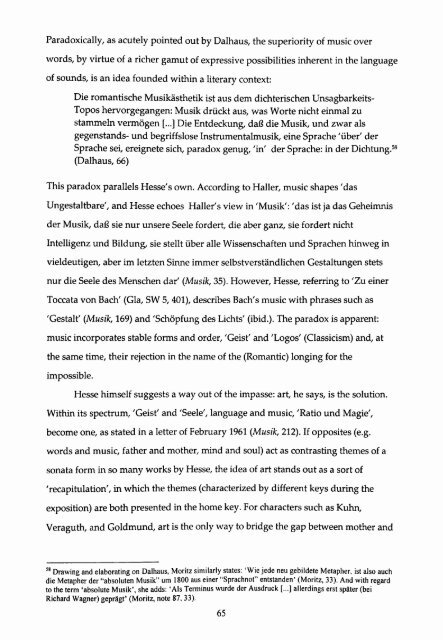HERMANN HESSE AND THE DIALECTICS OF TIME Salvatore C. P. ...
HERMANN HESSE AND THE DIALECTICS OF TIME Salvatore C. P. ...
HERMANN HESSE AND THE DIALECTICS OF TIME Salvatore C. P. ...
Create successful ePaper yourself
Turn your PDF publications into a flip-book with our unique Google optimized e-Paper software.
Paradoxically, as acutely pointed out by Dalhaus, the superiority of music over<br />
words, by virtue of a richer gamut of expressive possibilities inherent in the language<br />
of sounds, is an idea founded within a literary context:<br />
Die romantische Musikasthetik ist aus dem dichterischen Unsagbarkeits-<br />
Topos hervorgegangen: Musik driickt aus, was Worte nicht einmal zu<br />
stammeln vermogen [...] Die Entdeckung, dafi die Musik, und zwar als<br />
gegenstands- und begriffslose Instrumentalmusik, eine Sprache 'liber7 der<br />
Sprache sei, ereignete sich, paradox genug, 'in 7 der Sprache: in der Dichtung.58<br />
(Dalhaus, 66)<br />
This paradox parallels Hesse's own. According to Haller, music shapes 'das<br />
Ungestaltbare7, and Hesse echoes Haller's view in 'Musik7 : 'das ist ja das Geheimnis<br />
der Musik, dafi sie nur unsere Seele fordert, die aber ganz, sie fordert nicht<br />
Intelligenz und Bildung, sie stellt iiber alle Wissenschaften und Sprachen hinweg in<br />
vieldeutigen, aber im letzten Sinne immer selbstverstandlichen Gestaltungen stets<br />
nur die Seele des Menschen dar 7 (Musik, 35). However, Hesse, referring to 'Zu einer<br />
Toccata von Bach7 (Gla, SW 5, 401), describes Bach's music with phrases such as<br />
'Gestalt' (Musik, 169) and 'Schopfung des Lichts' (ibid.). The paradox is apparent:<br />
music incorporates stable forms and order, 'Geist7 and 'Logos' (Classicism) and, at<br />
the same time, their rejection in the name of the (Romantic) longing for the<br />
impossible.<br />
Hesse himself suggests a way out of the impasse: art, he says, is the solution.<br />
Within its spectrum, 'Geist' and 'Seele', language and music, 'Ratio und Magie',<br />
become one, as stated in a letter of February 1961 (Musik, 212). If opposites (e.g.<br />
words and music, father and mother, mind and soul) act as contrasting themes of a<br />
sonata form in so many works by Hesse, the idea of art stands out as a sort of<br />
'recapitulation', in which the themes (characterized by different keys during the<br />
exposition) are both presented in the home key. For characters such as Kuhn,<br />
Veraguth, and Goldmund, art is the only way to bridge the gap between mother and<br />
58 Drawing and elaborating on Dalhaus, Moritz similarly states: 'Wie jede neu gebildete Metapher, ist also auch<br />
die Metapher der "absoluten Musik" um 1800 aus einer "Sprachnot" entstanden' (Moritz, 33). And with regard<br />
to the term 'absolute Musik', she adds: 'Als Terminus wurde der Ausdruck [...] allerdings erst spa'ter (bei<br />
Richard Wagner) gepra'gt' (Moritz, note 87, 33).<br />
65
















